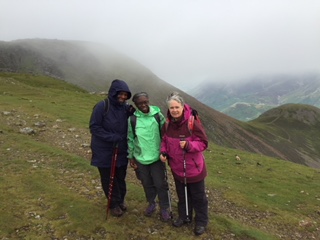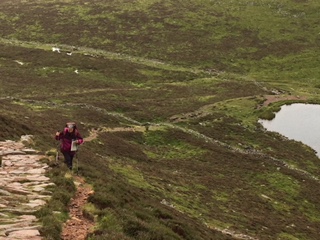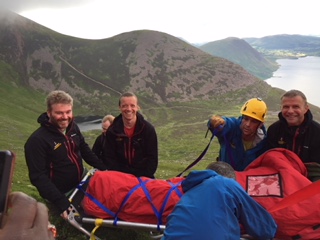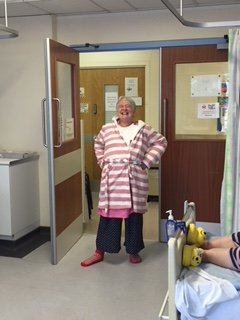Joanna McGregor is one of the members of the Mindfulness Association. She was kind enough to share her inspiring story of how after a terrifying mountaineering accident, her mindfulness and compassion practice not only carried her through but enabled a deep sense of gratitude and a love for life to take root. Have a read….
I was brought up in a family that loved the outdoors. I regularly climbed trees. We were all strong. Dad took all of us walking as children so that Mum could have time to garden, and in my teens I used to rock climb quite safely with a school friend because then my balance was good and he was a good climber. In the Summer when it was busy and hot we went sailing on the Lake. I was totally fearless. As I grew older and became less fit, I was unhappy about walking with groups that were more fit, but still felt quite secure walking. I never dreamt that one day I might have a near death experience in the hills that would leave me feeling so lucky to be alive.
 I had a serious mountain accident in The Lake District nearly two years ago, when I was on holiday. The others in the group were ahead. The path onto the ridge was one of the early paths to be built, with steps that seemed enormous. I hadn’t hiked a steep mountain for a year, although I had walked on lower levels, and the ascent exhausted me. To try to keep up with the group, I set a pace for myself that was uncomfortably fast.
I had a serious mountain accident in The Lake District nearly two years ago, when I was on holiday. The others in the group were ahead. The path onto the ridge was one of the early paths to be built, with steps that seemed enormous. I hadn’t hiked a steep mountain for a year, although I had walked on lower levels, and the ascent exhausted me. To try to keep up with the group, I set a pace for myself that was uncomfortably fast.
After lunch near the top, heavy mist came in, then we lost our way. The shepherd’s path petered out and became a sheep track. We realised we were heading down the same path we had ascended, rather than heading towards an easier contour path. That was the last straw — I couldn’t face it. Mentally, I was finished. Also, I was angry inside. Remembering the huge steps of the ascent which had seemed to go on and on, it seemed that the descent would be even worse.
I can’t remember exactly how I was injured. It all happened so quickly and is a bit of a blur now. At one point there was a small scramble down. The way the others chose looked difficult to me so I opted for another route which involved negotiating an overhang. I don’t think I was aware of that – I’m usually very good at testing the footholds before planting my feet. Maybe it was exhaustion. I was facing the rock, which I thought was the safest thing to do, but I fell and my new, heavier rucksack seemed to pull me down. I plummeted and rolled, gathering momentum, my head hitting stones . I didn’t feel any pain, but then I hit a boulder head on.
blur now. At one point there was a small scramble down. The way the others chose looked difficult to me so I opted for another route which involved negotiating an overhang. I don’t think I was aware of that – I’m usually very good at testing the footholds before planting my feet. Maybe it was exhaustion. I was facing the rock, which I thought was the safest thing to do, but I fell and my new, heavier rucksack seemed to pull me down. I plummeted and rolled, gathering momentum, my head hitting stones . I didn’t feel any pain, but then I hit a boulder head on.
Joanna! The urgency in my sister’s voice woke me up, and it seemed as if she was reminding me of my upbringing – we are McGregors, leaders of clans! I needed to do something to stop my slide down the mountain. I put out my arm and I knew that my wrist would be broken and I might not be able to play the piano any more, but I wanted to save my life. I flipped onto my front, the way I’d been taught in the gym club at school. And then the sliding stopped. I knew I was injured – there was blood running down my face, and I was right, my wrist had been broken. I felt like an injured animal.
My sister began scrambling down to where I lay. She was with me in minutes, and she called 999. Eventually she got through to the local Mountain Rescue Centre. She followed their instructions and the mountain rescue team were able to pinpoint our location and to keep in touch with her. Our friends got out their survival bags and covered me with their blankets, and munched on energy bars. My sister had lost her appetite, and I remembered my nurse training and knew I should keep completely still to prevent further injury and not eat anything in case emergency surgery was necessary.
It was cold and bleak in the mist. I remained conscious. I was thinking about serious injury – brain haemorrhage, internal bleeding. It all seemed unreal that this was happening to me.
Lying there, I remembered words of Jon Kabat-Zinn, a professor of medicine who teaches reduction of stress through mindfulness. ‘So long as you are breathing, there is more right with you than wrong with you’ The memory of these words comforted me.
After what seemed like a long time we heard the welcome sound of a helicopter. It circled us, but the mountain terrain was rough and loose, and there was nowhere to land. The noise of the helicopter faded into the distance. The situation seemed hopeless. But, to my immense relief, out of the mist appeared two figures, a doctor and a paramedic, who had climbed up the steep slope from the helicopter below. With their arrival we all began to feel safe and members of our party were soon helping the rescuers put up a tent to keep us all warm. I was examined and given two injections, even though I wasn’t in pain at that time. I trusted them to do what was needed.
Meanwhile, volunteers were pelting up the mountainside carrying rescue equipment . They brought a heavy stretcher which worked like a sledge. Carefully they lifted me onto it and strapped me down. The stretcher is so heavy it took 14 working in relays to lift and pull it to where the helicopter had landed. The air ambulance lifted off, and we were on our way at last.
. They brought a heavy stretcher which worked like a sledge. Carefully they lifted me onto it and strapped me down. The stretcher is so heavy it took 14 working in relays to lift and pull it to where the helicopter had landed. The air ambulance lifted off, and we were on our way at last.
In the helicopter I kept quiet so that I didn’t distract the team from monitoring me. Imagine my surprise when over the radio I heard a familiar voice – it was my former director from work, coordinating the rescue from the base. At first I struggled a bit with this – I hadn’t always found work easy. But then I reflected – I remembered a compassionate letter he wrote to me when my Mum had died many years ago, and how Dad had been moved by it. I also remembered how he shared my love of being in the mountains and, how, like myself, he had always wanted to help other people. Now he was he was helping if possible to save my life The rest of the hiking party was accompanied by the rescue team down the mountain, then my sister drove them back to our apartment before making the long road journey to the Preston Royal Hospital to be with me.
After my condition was stabilized in Accident and Emergency, the medical staff began tending my injuries – my wrist was plastered, plastic surgery was performed on my face under local anaesthetic. Trolleys were pushed in and out so fast and help was provided with such ease that my sister said it was ‘like scones being baked in the oven!’ Meanwhile, I lay still and quietly meditated, doing the Metta Practice, just as Sharon Salzburg describes in her recorded teaching. Metta Practice is a form of meditation which kindles loving kindness for all living beings – oneself, friends, enemies, animals, strangers … Loving kindness grows from inspired phrases which reflect our deepest interest. The phrase I used at that time, for myself and for the theatre staff, was, ‘May I be safe, may I be happy, may I be healthy, may I live with ease.’ This was a phrase I could easily focus on, one I could readily recall, and one that seemed appropriate to my situation.
The Occupational Therapy Department fitted a ‘fencing brace’. This supported my spine and gave my broken vertebrae the chance to heal. My background in yoga and rock climbing enabled me to keep my back straight and aid the healing process.
There was never a dull moment on the ward. It was always busy with acute emergencies and evolving situations. There were people much worse off than me who were brave and humorous. There was good teamwork among the staff. Porters, cleaners and nurses alike, treated the patients with tough love, jokes and kindness. The nurses helped me move in and out of bed, and negotiate stairs, and perform ablutions and shower. Although I suffer from manic depression, I settled in the ward and forgot about my own problems. The Preston Royal is a specialist hospital which provides superb care. I was so lucky to be admitted there. The holistic treatment from the staff helped me to recover from my physical injuries, but I also healed in other ways too. I became aware of aspects within myself that I never knew before. I realised that I am sociable, that I have inner strength. I was inspired to laugh more – to survive in a hospital you need a brilliant sense of humour!
Family and friends rallied around. My sister visited every day, a trip of several hours, and brought shopping – not the firm white cauliflowers she used to bring for Mum at home, but dressing gowns, fruit, books – in fact, whatever I needed. My brother washed my clothes and brought treats like peppermint creams. His wife lent me a ‘slanket’, a type of fleecey blanket with arms. My aunt and her family came all the way from Aberdeen, friends from the charity shop where I volunteer came too.
Initially, I was on morphine and codeine for the pain, but they gave me strange dreams, and they meant I had to use laxatives which led to me feeling like an untrained spaniel puppy!
Also I knew that dealing with the pain was somehow up to me. So after a week I stopped using them and managed the pain with paracetamol and meditation.
There were two guided meditations that I listened to during the day which greatly benefited the healing process while I was in hospital – the ‘body scan’ by Jon KabatZinn and the ‘compassionate body scan’ from The Mindfulness Association. These meditations stabilized my mood as well as helping with managing the pain and with healing. It was these meditations that helped me come off the morphine, and to overcome the temptation to scratch at my itchy stitches.
Three of my favourite gems of the compassion meditations that I learnt from Samye Ling helped me through the ordeal are: ‘ I am not alone’, ‘RAIN Practice (based on The Guesthouse poem), and ‘Safe Place’. At night as I lay awake, perhaps listening to a vulnerable old person in the annex next door, shouting to go home, I would remember phrases shared by Clive Holmes, ‘This is a difficult moment. We all experience moments of difficulty. What can I do in this moment of difficulty?’ Or I would reflect, ‘I am not alone’ – hospital staff and patients are awake all over the world. Occasionally I’d ask for toast, or get up for a while. Or I would meditate on all the sounds from the machines on the ward, listen to other people awake and whispering or peacefully asleep, the doctors giving instructions to help with procedures.
 Like doctors, I believe that everyone’s life is precious. I saw them working round the clock, performing incredible operations to save lives. They worked weekdays and weekends. I watched everyone in the hospital do their very best in the circumstances that they found themselves in. I remembered what a survivor my Dad had been, and how warmhearted and determined my Mum had been. I was glad to be alive. There was so much to be thankful for – I hadn’t sustained any serious damage to my nervous system, the conservative treatment of my broken vertebrae was succeeding. I was becoming more independent. There had been many tough times over the past weeks, but also heartwarming encouragement from everyone, staff and patients. When the time drew near for me to leave the hospital, I knew I would miss them all, and life on the ward, but I had to move on.
Like doctors, I believe that everyone’s life is precious. I saw them working round the clock, performing incredible operations to save lives. They worked weekdays and weekends. I watched everyone in the hospital do their very best in the circumstances that they found themselves in. I remembered what a survivor my Dad had been, and how warmhearted and determined my Mum had been. I was glad to be alive. There was so much to be thankful for – I hadn’t sustained any serious damage to my nervous system, the conservative treatment of my broken vertebrae was succeeding. I was becoming more independent. There had been many tough times over the past weeks, but also heartwarming encouragement from everyone, staff and patients. When the time drew near for me to leave the hospital, I knew I would miss them all, and life on the ward, but I had to move on.
By September 2016, the hospital period of rehabilitation was over and I returned to my flat. What a change! At first I had the support of a carer who breezed in and helped me shower, and a recovery team to help me adjust. A month later they left, and I missed them. I also missed life on the hospital ward, no doctors to keep me on my toes, no daily visits from my sister, although my brother visited when he could.
After another month, my sister and I attended an appointment at the outpatient room, and the consultant declared that I had made a complete recovery. It was only when my sister exclaimed, ‘Yippee!’ and jumped for joy that I realised how worried she had been all this time. The only thing I had to show for my ordeal was a hairline scar on my face.
I decided to restart my piano lessons. I was given two physiotherapy appointments to help regain the use of my wrist and back. But despite this, I found it difficult. A sense of loneliness engulfed me, and I began to get depressed. I received a beautiful letter from the outpatient consultant offering me encouragement, but that was not enough. I needed to find more help to find a new life in this Post-Dispatch phase.
That help came through my Community Psychiatric Nurse. I started attending the Recovery College organised by CADAS. This is a course for people who are recovering from mental health problems, teaching life coping skills.
My happy experience of the hospital ward made me realise how important it is to be involved in a community. So I have started attending classes in physio-pilates. This has helped with my physical mobility and strength, and my back is much better now. I have returned to volunteering with Age UK. I also have fun doing housework with my cleaner. There is a lively creative writing group in the café where I meet the Recovery Group, and I’m enjoying my piano lessons again – I hope I will be able to play for others one day. From time to time I walk with the local ramblers, and my sister sometimes joins me for holidays – we are happy to walk on different grades during the day, and meet up in the evenings.
At the time of writing, August 2017, I have been discharged from the NHS, and I have said goodbye to my CPN. A further adjustment lies ahead on the road to a full recovery. From time to time I experience a lack of connection, I isolate myself from others and feel alone. That can lead to paranoia or mood swings brought on because I refuse to acknowledge my suffering and the suffering of others, (Sharon Salzburg describes this in her books), and I become unwell. But I have that compassionate letter from my psychiatrist, a tool kit of meditations, and the help of my Ffriends and family, and I’m learning not to kick myself quite so hard. My inner, critical voice is slightly softer now, and I meditate more than I did before the accident. As Maya Angelou puts it, I have so many rainbows in my clouds. So many people have helped me along the way, and now whenever I need them I remember them – they come with me wherever I go.
Through the accident and the help of others, my life has been transformed – I can never feel that my life is not worthwhile when so many people in the NHS, the mountain rescue, volunteers, paramedics, neighbours, friend, family, and others from Samye Ling, have worked so hard to help. The love and support have been overwhelming. Surviving a close to death encounter on the mountains has taught me so much about myself and others, and I hope my story brings happiness.
Post script a year on
I was discharged from the mental health services 9 months ago. I have been fine but just at the moment I’m finding life hard. It’s exciting times. I’m moving into a bungalow with a garden! But I won’t have a spacious hall cupboard and loft for storage there. So I have to downsize … Everyone is helping me with this new venture. I am also remembering my coping skills and my family are a great support. Today I listened again to a lovely meditation which was shared by Clive Holmes, just when I was getting stressed about becoming ill again. At the end of this meditation Clive gives the invitation to ask: ‘Is this real?’ So I asked myself; ‘ Is this real ? ’ Are my thoughts really true? Perhaps I wasn’t ‘ slipping back as I had thought, but just had a natural reaction to moving house and needn’t fear that I was becoming ill. I then reflected on a few of the things that made me feel lucky. I concluded that I must be one of the luckiest people alive! I felt better. That inspired me in turn to play the piano and to send a recording to my sister. She responded immediately saying how much she had enjoyed listening to it. Following that I went out and kept a lunchtime engagement with friends. So I think I have come a long way.
With thanks to Clive Holmes and The Carlisle Meditation Group The tutors and participants on The Mindfulness Association Courses My sister for correcting details of the rescue The editing completed by Joan Gooding and encouragement from friends including Khareen Pech. Ref: book with CD: the Mindful Way Through Depression, Jon Kabat-Zinn, books by John Williams online meditations by Sharon Salzberg, Kristin Neff. Tara Brach. Jack Kornfield
-Joanna McGregor
To visit our website: please click here
To join our membership: please click here
Follow us on YouTube: please click here
Follow us on Facebook: please click here
Follow us on Instagram: please click here

